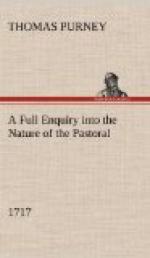I need not make the Distinction between an Epick and a Pastoral Writer’s manner of Imaging. They are widely different; nor can a Pastoral Image so many Things as an Epick Writer. For he cannot consider Things as Persons, nor use the other Methods that Heroick Poetry takes to effect it.
CHAP. V.
Of the Thoughts. And which are proper for Pastoral, which not.
I Shall not consider those Thoughts which are, in their own Nature, Vicious; as the Ambiguous, the Pointed, the Insipid, the Refined, the Bombast, and the rest. But of those Kind of Thoughts which are in themselves good, only these three do properly belong to Pastoral; namely, The Agreeable, or Joyous; The Mournful, or Piteous; And the Soft or Tender.
Yet the rest of those Thoughts which are in their own Nature good, may be so order’d as to bear a part in Pastoral. For as We may make a Shepherd false to his Mistress, if he be offended with the Levity of his Nature; so We may make a Lass Ill-natured and Satyrical, for Instance, if ’tis not in her Temper, but assumed only for a good Purpose.
SECT. 2.
Of those Thoughts which are proper for Pastoral, how to Judge which are finest.
I need only observe, that where is the greatest Combination of those things which make the best Figure in Pastoral, that is always the best Thought. As a Thought that is not only agreeable or Beautiful, but has also Simplicity. The two finest Passages that I remember in THEOCRITUS for their Simplicity, are these. Which are exceeding well Translated by CREECH; whose Language (next to some of Spencer’s) is vastly the best we have, for pastoral. I will quote the whole Passage.
Daph.) And as I drove my Herd,
a lovely Maid
Stood peeping from a Cave; she smil’d,
and said,
Daphnis is lovely, ah! a lovely Youth;
What Smiles, what Graces sit upon his Mouth!
I made no sharp Returns, but hung my Head
And went my Way, yet pleas’d with what
she said.
Idyll. 8.
Of the same Nature is what COMATAS says in another Place.
Com.) I milk two Goats; a Maid
in yonder Plain
Lookt on, and Sigh’d, Dost milk
thy self poor Swain!
And what follows soon after.
Com.) The fair Calistria, as my
Goats I drove,
With Apples pelts me, and still murmurs Love.
Idyll. 5.
Tho’ these Thoughts are so exceeding Beautiful thro’ their Simplicity, I rather take ’em to be Agreeable Thoughts; and Simplicity to be only an Adjunct or Addition to ’em; as Passion is an Addition and Embellishment to the Sublime Thoughts.
The Mournful Thought, with the Addition of Simplicity, is as pleasing, I think, as the Agreeable with Simplicity. The finest of this kind that I remember in THEOCRITUS, are in his 22 Idyll. A Shepherd resolves to Hang himself, being scorn’d by the Fair he ador’d. For the more he was frown’d upon the more he loved.




